India has the fourth highest number of malaria cases in the world.
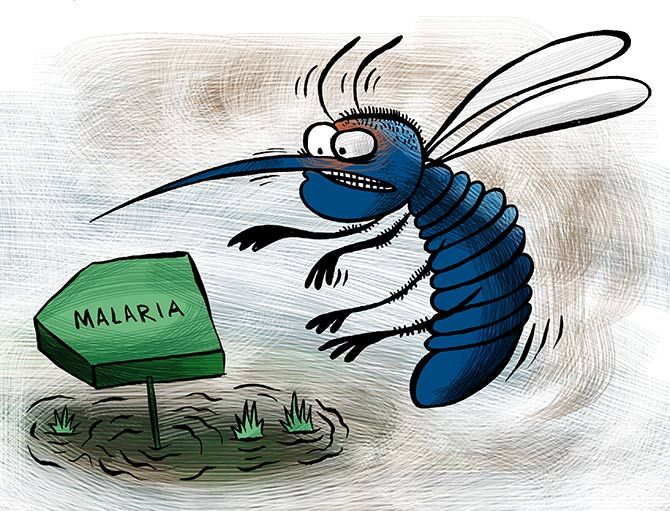
Malaria, according to a CBS News report, is estimated to have killed 50 billion people -- more than five times the world's present population -- ever since man walked the earth.
Last year mosquitoes killed 830,000 people all over the world, via a variety of diseases, including malaria.
Around 4% of malaria fatalities were in India.

Malaria can be gradually contained and then stamped out, even if mosquitoes are not, says malariologist Dr Christopher Plowe.
The director of the Duke Global Health Institute in the USA and professor of medicine, molecular genetics and microbiology and global health, Dr Plowe has been waging war on malaria since the early 1990s.
One of the top experts in his field, the main focus of Dr Plowe's pioneering work over the last few years has been molecular epidemiology (incidence, distribution and control) of drug-resistant and 'vaccine-resistant' malaria.
"Before the global malarial eradication campaign, led by WHO, in the 1950s there were tens of millions of cases of malaria in India every year. In response to the global eradication campaign, which was very active in India, that was reduced to less than 100,000 a year -- a dramatic reduction. But then there was sort of an over-confidence and complacency, and it returned to millions of cases every year," Dr Plowe, who has travelled extensively in malaria-ridden belts in Africa and Asia, tells Vaihayasi Pande Daniel/Rediff.com.
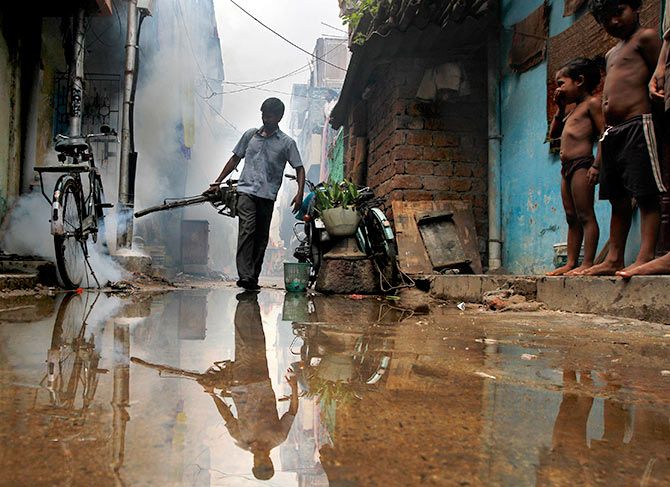
What about the problem of malaria is specific to India?
India has the most malaria cases outside of sub-Saharan Africa and certainly by far in Asia.
As with all developing nations, India has a very broad range of accessibility to public health in different states and regions. Especially in the rural areas, where there is a lot more poverty -- that's where malaria continues to be a problem, after it is no longer an issue in more developed areas in the cities.
In India, particularly, it tends to be more of a problem in the more remote areas, some of the border areas, where it is just really difficult to implement the kind of health and measures that (are required to bring) control and ultimately to eliminate malaria.
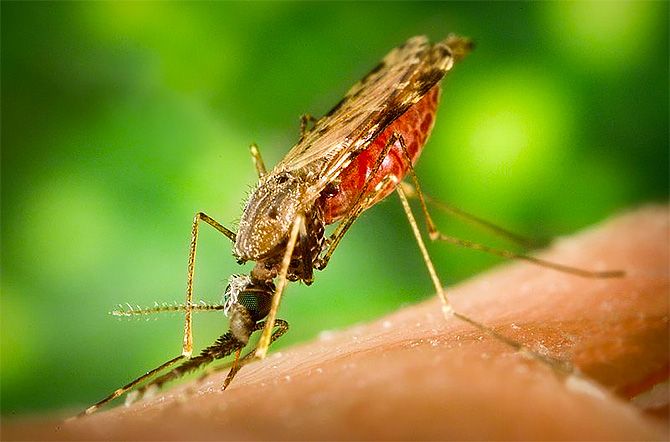
What are the most daunting problems facing those fighting malaria?
The bad news is that the resistant malaria has been emerging and spreading throughout Southeast Asia. At this point it is quite prevalent, quite common in Cambodia, parts of Laos, Vietnam and Myanmar.
It has not yet reached India. One of the reasons we, WHO and governments in the region are trying very hard to eliminate it in the greater Mekong sub-region in the Southeast Asian countries, is because we want to prevent the spread of these resistant strains of malaria to India.

Because that will be a terrible problem for everyone?
Right now we don't see them (resistant strains of malaria) in Bangladesh. We don't see them in India.
We don't even see them in western Myanmar, Rakhine state.
We want to keep it that way because the concern is there will be great difficulties in India if you are no longer able to treat malaria.
But secondly, historically, once drug resistant malaria reaches India, it will not be too long before it reaches Africa.
We will have a huge problem if that happens with resistant malaria just because there is so much more malaria in Africa.
To give you a little bit more understanding of the drug resistance problem: Right now we use combination therapy to treat malaria.
So at least two drugs are given together. When you have resistance to one drug, the (other) can still cure malaria.
But now in Cambodia we are seeing high rates of resistance to both drugs at the same and that's when you start to talk about untreatable malaria. Right now that is limited to (the Cambodia region).
The only way to really prevent it (from spreading) elsewhere, including to India, is just to completely eliminate malaria in that region.

What is the good news?
One piece of good news is that in most parts of the world, including India, resistance (resistant malaria) has not spread and the (medicines/drugs) we have are still very effective.
Even more powerful good news is that in many, many countries, we are making great progress towards malaria elimination.
It is very dramatic how rapidly malaria rates have gone down in countries like Myanmar, (which is) making a real effort in eliminating malaria.
China has no more local malaria transmission inside China. They still have cases imported from Africa, Myanmar.
They are on track now to declare China malaria free by WHO within the next year or so.
That's really good news: If we can do it in China, if we can do it in Myanmar, Vietnam is close to elimination, Sri Lanka is now malaria free for the last several years. Despite unrest and civil war they succeeded.

I am calling you from Mumbai. I am batting off mosquitoes as we speak, many more, one feels, than there were some years ago.
To my mind, as populations in urban areas in India continue to increase, rapidly, without proper city planning, it will bring more and more mosquitoes and consequently more malaria.
The only measure, for instance, that Mumbai administrators seem to use every mosquito season is a poster campaign, drain spraying and mosquito fogging, using various chemicals, one of them being pyrethrin.
Is that effective or harmful?
The malaria transmission dynamics are very complex.
It is not just the mosquitoes, of course.
It is what happens with people who have malaria infections in big urban areas, including Mumbai and big cities in India. As long as it is that people who are infected with malaria are being diagnosed (and treated) then nobody is transmitting malaria.
Along as the health system in big cities like Mumbai and Delhi and others the people are promptly diagnosed and treated then it doesn't matter that you have mosquitoes.
I will give you a very telling example, which is that in the United States and England we still have mosquitoes that are capable of transmitting malaria (the anopheles female).
The reason we do not have malaria is because when a human being arrives in England, or arrives in the United States, with malaria they are treated and it is not transmitted to mosquitoes.
Even though you still have mosquitoes in these cities (Mumbai and Delhi) and even though the range of mosquitoes may not change, as long as the health system is able to take care of the people with malaria, then we can still succeed in eliminating malaria

What about efforts like mosquito fogging? Is it effective?
The challenge with malaria is that nothing is simple. Nothing is simple.
So fogging may work in one context.
In another situation sleeping under bed nets impregnated with insecticide can be very effective.
But in other areas mosquitoes are not biting indoors at night. They are biting outdoors in the forest. So workers working in a forest are getting malaria when they are outside, then putting nets inside doesn't help.
Likewise, you can fog in a densely-populated city. Yet malaria is being transmitted in remote mountains. It is simply not possible to fog there.
My short answer is really there is no one magic bullet. We have to use the right (approach) in the right situation. Every situation may require a customised, tailored approach to succeed.
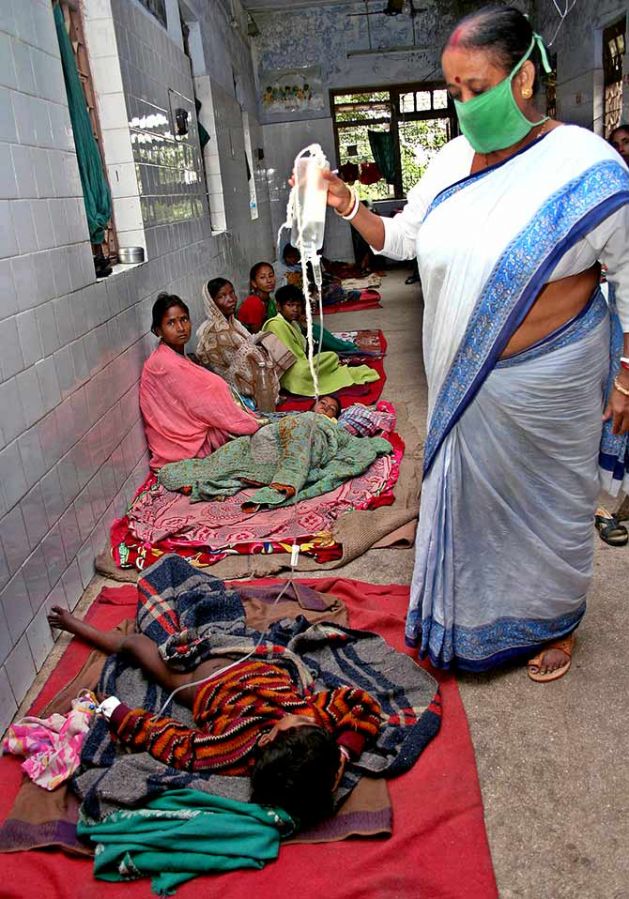
One has to always measure or make an overall assessment of one's safety. When it comes to mosquitoes that might be carrying malaria versus chemicals that ward off mosquitoes, what should one choose?
There are lots of safe ways to protect yourself from mosquitoes, most importantly insecticide-treated bed nets (in areas where nets are effective and mosquitoes bite at night), which are not only safer but more effective than smoky coils, which should not be used in enclosed spaces.
Based on your experience, what does India need to know about malaria?
One thing that people should know about malaria is that it can be eliminated.
Governments and development partners are going to have to work relentlessly to eliminate malaria.
Even though it is tempting to let up on elimination efforts once the malaria burden falls to low levels, it is critical to finish the job.
If we stop and do not eliminate fully, it will come back.
A very compelling example is actually in India.
Before the global malarial eradication campaign, led by WHO, in the 1950s there were tens of millions of cases of malaria in India every year.
In response to the global eradication campaign, which was very active in India, that was reduced to less than 100,000 a year -- a dramatic reduction.
But then there was sort of an over-confidence and complacency, and it returned to millions of cases every year.
The lesson is that you can make progress, but if you stop before you have eliminated it, then malaria rebounds.
There are many examples of dramatic reductions in malaria, followed by shifting resources to other health problems, and then dramatic resurgence of malaria.
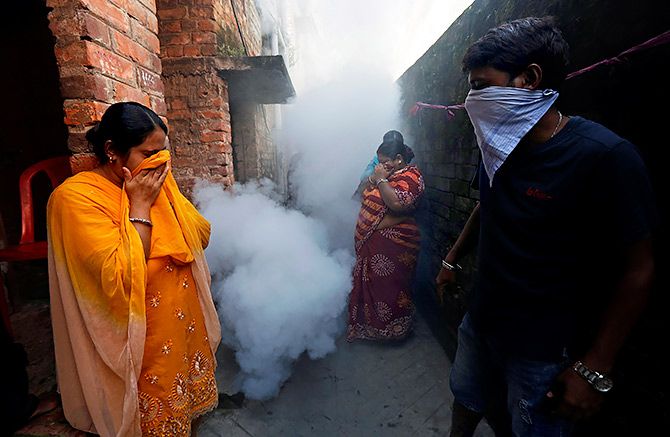
A large country like China with such a huge population can be on the verge of malaria eradication. India should be able to do it quite easily as well.
If China can do it, India can do it.
It is fairly simple in terms of health interventions, it is relatively inexpensive. The most important component of the later stages is surveillance and surveillance just means looking for cases.
Surveillance is relatively inexpensive and useful activity for any country to perform. So the formula for success is simply to be relentless and not stop until you are done.
That's what China did. That's what Sri Lanka did. There is no reason why India could not do the same.
If there is another person in the house who has malaria, is that person contagious?
A baby can get malaria from their mother at the time of birth.
And you can get malaria from a blood transfusion if the blood supply is not carefully checked. Of course, every hospital that does blood transmission checks the safety of their blood. But on rare occasions there have been examples of so-called transfusion malaria. That is very rare and it is not something people should worry about.
In terms of person to person transmission that is not something that happens. There is no sexual transmission or there is no transmission from touching, or anything like that.
The only way that malaria can get from one person to another is by transferring blood. Mosquitoes are very efficient at that and blood transfusions can rarely do that

What are some of the new tools available to fight the disease?
Quite a lot of efforts to improve our ability to do surveillance in particular to use a combination of remote sensing (techniques) and geospatial mapping and modelling to predict where malaria will exist in these remote areas where it tends to persist.
But another exciting area would be vaccines.
Right now we do not have an effective vaccine that can help to eliminate malaria. But there is quite a bit of research to try to improve the current generations of vaccine to get them so that they are effective enough so that they could help to eliminate malaria.
Of course, vaccines are some of the most effective public health tools we have. If we had an effective malaria vaccine then we would be much more likely to succeed in our mission of eradication.
India has been a real leader in malaria research in some of the genomic work and vaccine development.
There are at least two centres of excellence for malaria research in India that are supported by the US National Institutes of Health.
One (the Centre for the Study of Complex Malaria in India) is in collaboration with New York University (under) ICMR (Indian Council of Medical Research) who partner with different research institutes, universities and hospitals in India to develop new tools and approaches for malaria elimination.
The other is (in collaboration with) the University of Washington (University of Washington's International Center of Excellence for Malaria Research in South Asia which partners with the Centre for Infectious Disease Research and the Goa Medical College).

What are some of the new tools that you, as someone who researches malaria elimination, are needed? I read one of Bill Gates's articles about data being very important. What are the new tools that you feel are very important?
One of the most important new tools is more sensitive diagnostic tests. And the reason that's important is because there are a lot of people in India and other countries who are infected with malaria but they are not sick.
People can be carriers.
They can be transmitting malaria through mosquitoes, though their immune systems prevent them from becoming ill.
And the standard tests we use to detect malaria in people who are sick and having a fever they are not able to find parasites in these people who have no symptoms.
How many years do you think it will take -- given that India is a large country and has a lot of malaria and there is a lot of malaria in Africa -- for malaria to vanish totally?
I am reluctant to predict because most (people) who predicted are wrong, but I will say I have heard Bill Gates says he expects malaria to be eliminated in his lifetime.
I think the optimists among us think this is a reasonable call, (that) in the next 20 to 30 years, if the governments in the developing, middle income and more wealthy countries make a real commitment.
This is a problem that can be solved. Again there are many good examples -- China, Sri Lanka -- where they have eliminated malaria despite many challenges. Based on those successes there is really no good reason why it couldn't be done in other countries.

In a country's fight against malaria what are some of the setbacks?
One of the real threats to successful elimination is the lack of sustained commitment. That's why it is very important for heads of State, for parliaments and other politicians to be aware of and committed to the campaign for global malaria eradication.








